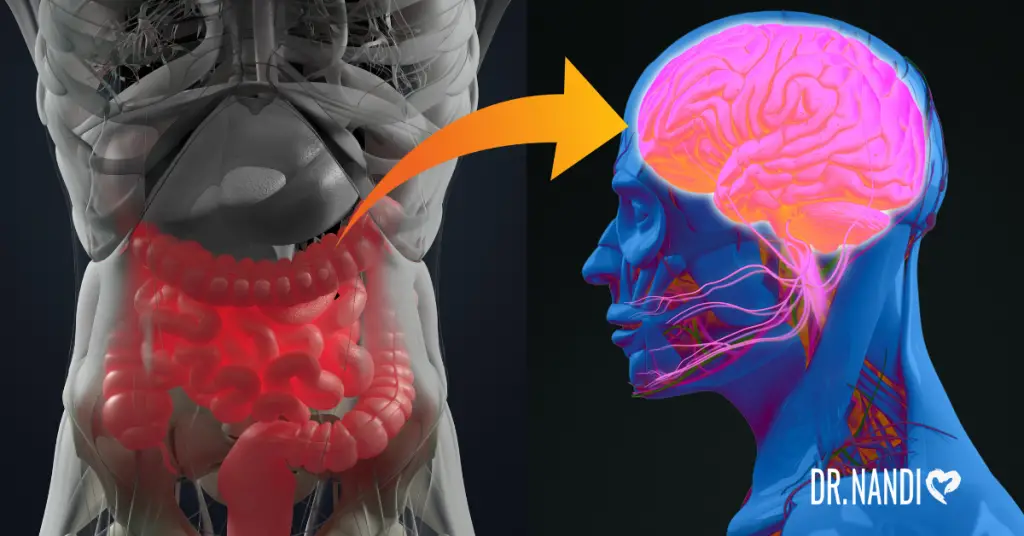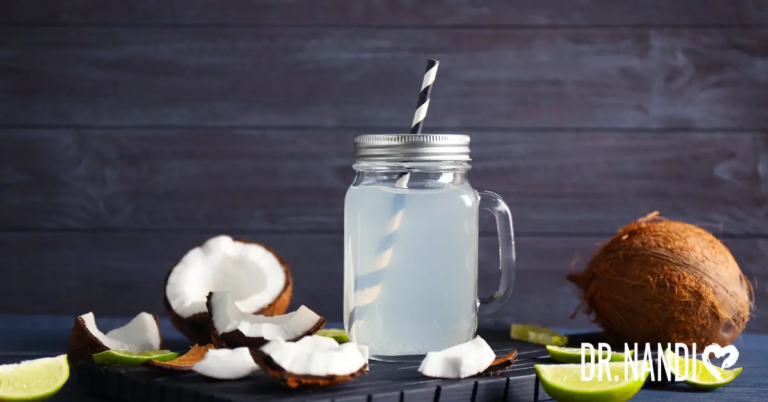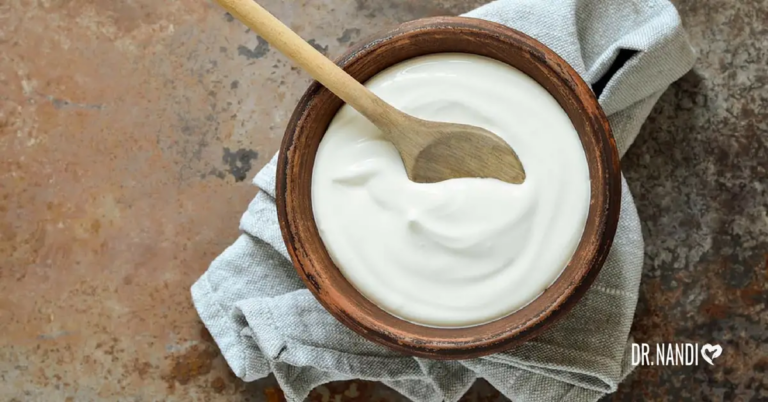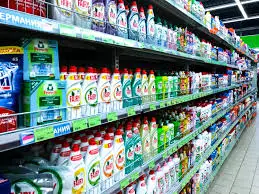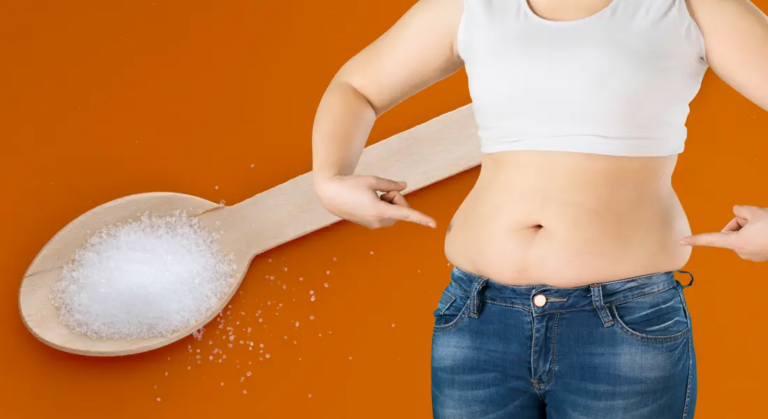As a practicing physician, I’ve worked with thousands of patients who suffer from depression. Depression is a rising problem across the globe, with over 350 million sufferers across the world and 16 million adult sufferers in the US alone.
An essential question in the minds of medical professionals is: what is the root cause of depression?
For many decades, the common theory surrounding depression has been that a chemical imbalance causes it in the brain. More specifically, a deficiency in neurotransmitters like serotonin. Otherwise called the “serotonin model.” I say theory because although this belief is still widespread, it has been largely debunked by modern science as the sole cause. (1, 2, 3)
So, if not simply a chemical imbalance, what is creating such a widespread occurrence of depression worldwide? Not surprisingly, more and more research is pointing to inflammation and the health of one’s microbiome to be strongly linked to mental health. (4)
Is Inflammation The Cause Of Depression?
Inflammation is a reaction in the body to foreign substances, injury, infection, or damage. It’s the body’s cue to pay extra attention to something going on. It is designed to help the body in the short term. But if the cause of inflammation persists or isn’t addressed, inflammation continues to rage, and other problems arise.
Imagine, for example, that your car needed an oil change. To keep your vehicle in good working order long term, you need to change the oil regularly. But if you don’t, your car will begin to run less efficiently, the oil will become less effective at lubricating your engine, and it will not absorb heat. Although you might not recognize trouble right away, your engine will have major problems in time, and the car is not likely to function well long-term.
Leaving inflammation unaddressed is like never changing the oil in your car. Inflammation becomes chronic, and your body begins to suffer.
Along with leaky gut syndrome, irritable bowel syndrome, inflammatory bowel disease, joint pain, chronic fatigue, and many other symptoms, depression seems to be strongly tied to inflammation. (5, 6)
Scientists are discovering that depression may not be a stand-alone disease but a SYMPTOM of chronic inflammation.
- Studies have found that those with measurable markers of inflammation do not respond to medication for depression. (8)
- Anti-inflammatory drugs such as aspirin and infliximab have been found to resolve symptoms in the above patients. (10, 11)
- A meta-analysis of 24 different studies found a correlation between inflammatory cytokines and symptoms of depression. (12)
- Inflammation is the core problem in numerous chronic conditions affecting Americans today. (13)
- The National Center for Biotechnology Information (NCBI) acknowledges depression as an “inflammatory disease.” (27)
If depression is a symptom of inflammation, then treating depression alone will not lead to true healing or resolution of symptoms long term. If we want to treat depression, we must address the core issue: inflammation.
Inflammation = Poor Gut Health
The part of your body most susceptible to inflammation in your gut. It is because you are constantly eating and drinking foods that have the potential to be inflammatory. Since there is only a one-cell layer between the digestive lining and your bloodstream, any damage created can become serious quickly.
Your gut is designed to take stuff in from the food you eat for energy, healing, and building blocks for cells. It naturally absorbs particular vitamins, minerals, and micro-nutrients from natural foods. Anything else that enters the body is unrecognizable and labeled as such.
When you eat heavily processed foods, refined sugars, preservatives, and other unnatural ingredients, your body does not know what to do with them. They are so processed that they are unrecognizable to our cells. If you eat them once or twice, there may not be any problems, but when you eat them repeatedly or become the bulk of your diet, the body will act defensively and mount an inflammatory response.
As you continue to eat the foods, the inflammation will continue and slowly damage the cell layer of your intestinal lining.
On a microscopic level, your cells start to split apart and eventually leave gaps in your intestinal wall. When gaps in the intestinal wall, foods can leak into your bloodstream undigested. It is known as a leaky gut syndrome.
As these foreign and toxic substances flood your bloodstream, your body recognizes the problem and answers with an autoimmune response, including inflammatory and allergic reactions, hormone imbalances, and depression. (7)
Unless the cause of inflammation is addressed (namely, what you are putting in your mouth and things like chronic stress), this process continues and worsens over time, affecting your gut, brain, and potentially everywhere else in your body. It is becoming more and more evident that depression is a huge side effect of this intestinal inflammation. (4)
The Role Of The Gut In Mental Health
Professionals often refer to your gut as your “second brain.” It is because it has an intimate connection with your actual brain and carries much responsibility for how you feel emotionally daily. As we progress in the study of physiology, we have come to understand that the brain-gut connection is far from symbolic. Research confirms that a healthy gut is essential for a healthy brain. (14)
The enteric nervous system contains millions of neurons that connect the gastrointestinal system (gut) with the brain. This system is so expansive that it can operate independently of the central nervous system (hence the nickname “second brain), although the two communicate regularly.
We know that inflammation can travel directly from your gut to your brain through the vagus nerve. (16) The vagus nerve is the longest in the body that travels from the brain to multiple parts of the stomach and intestines.
One of the quickest ways to improve my patients with depression is by calming the vagus nerve through dietary changes. To make proper nutritional adjustments, we focus on the health and needs of the microbiome.
The Microbiome
Your gut is home to trillions of bacteria, yeasts, fungi, viruses, and protozoans, collectively known as your microbiome. Your microbiome, on its own, weighs as much as 2-3 pounds. While certain bacteria create infection and disease, most bugs in your microbiome support your immune system and overall health. You have as many gut flora throughout your body as you do cells (possibly more!). (15)
To heal the body from chronic inflammation, leaky gut, depression, and virtually every other chronic disease, we must focus on supporting and cultivating the microbiome.
How To Heal The Gut, Resolve Inflammation & Eliminate Depression
I advise working closely with your trusted medical professional to create a best-suited plan for you and your needs. There may be adjustments you need to make to this plan based on your lifestyle or health history.
Remember, healing the gut is not a quick process. It took months and years for your gut to become inflamed and damaged, and it may take several months to a year to bring it back to optimum condition. Patience and commitment are critical elements to regaining vitality and wellness.
Step One: Remove What’s Causing Inflammation
When my patients come in with symptoms pointing to a microbiome/gut issue, I always recommend they follow a strict no-processed foods diet for a designated amount of time. They don’t eat anything that comes out of a box, can, or wrapper. Everything must be fresh, natural, whole foods. I will give more examples in the next step.
Depending on the patient, I might suggest removing dairy and gluten from their diet. It is unnecessary for everyone but is essential for those with an underlying sensitivity or allergy.
I recognize how challenging this step is for most people. Modern American lifestyles consist mainly of eating pre-made foods, processed freezer meals, take-out, packaged snacks, refined sugar, diet sodas, etc. But redefining your relationship with food is paramount to long-term healing.
Don’t worry; you don’t have to avoid every processed food or snack forever. Once your gut is in good health, I recommend my patients follow an 80/20 diet of healthy versus less healthy foods. It ensures you supply your body with a steady stream of healing, nutrient-dense foods while allowing occasional treats or indulgence. Life is about balance.
Step Two: Soothe Inflammation With Supplements & Healing Foods
Once the offenders (aka gut bombs) are out of the way (and out of the house), it is time to fill their place with wholesome, healing, natural foods. Choose foods with no ingredients list. I suggest filling your grocery cart, pantry and meals with a diverse variety of the following:
- Vegetables
- Leafy greens
- Fruits, berries
- Nuts and seeds
- Legumes
- Herbs
- Spices
- Poultry
- Wild-caught fish
- Some red meats
- Bone broth
- Coconut oil, avocado oil, butter, ghee
- Fermented foods (details below)
- Whole grains
Some helpful supplements to heal the gut lining and reduce inflammation include:
- Turmeric. I use turmeric every single day in my home-cooked meals. The main active ingredient in turmeric is called curcumin. It has been studied extensively and proven to be an effective anti-inflammatory. Some studies even suggest it is more potent than Prozac for treating depression. You can use turmeric as a spice or in supplement form. Combine with black pepper to enhance its bio-availability. (17, 18)
- L-glutamine. This essential amino acid is good for repairing the gut and intestinal lining. It has been shown to help repair damage caused by the leaky gut syndrome. You can take 2-5 grams two times daily as part of your healing protocol. (19)
- DGL Licorice Root. It is beneficial for those dealing with a lot of emotional stress, as it helps support the body in metabolizing cortisol (stress hormone). It also helps the body maintain a healthy mucosal lining in the stomach and duodenum. (20, 21)
Step Three: Repair And Replenish The Gut With Prebiotics & Probiotics
Prebiotics are foods that feed the bacteria in your gut, thus promoting the growth of beneficial microbes. These foods are not digestible by human cells, and we need them to fuel our microbiome.
Prebiotics are generally fiber or complex carbs. They can be found in many fruits, vegetables, and whole grains. If you are eating a diverse diet of natural foods (from the categories listed above), you should get plenty of these automatically.
Probiotics are specific strains of bacteria that help populate the gut and keep it in a positive balance. They help change the composition of your microbiome and may positively impact metabolism and overall well-being.
Fermented foods are made from vegetables, certain beverages, or dairy products and have naturally occurring probiotics. These are an excellent way to get vital probiotics and gut-healing nutrients in your diet. Most cultures worldwide include fermented vegetables or products in their daily diet.
Here are a few of the best kinds to start adding to your grocery list (or making at home).
- Kefir
- Kombucha
- Sauerkraut
- Pickles
- Miso
- Tempeh
- Natto
- Kimchi
- Raw, unpasteurized cheese
- Yogurt (choose one with low sugar content)
Step Four: Rediscover Your Purpose & Passion
I talk about this in-depth in my book, Ask Dr. Nandi. 5 Steps To Becoming Your Own Health Hero.
It is essential to look at the whole picture and not just physical symptoms when you are on a healing journey. What is the purpose that makes you excited to get out of bed in the morning? What is your motivation to heal? If you don’t know the answers to these questions, I invite you to take some time to ponder them carefully. Without a deep, underlying purpose to everything you do, your journey will feel like trudging through mud. With a powerful, intentional purpose in your heart, you are 100x more likely to succeed.
Here are some more questions to meditate on and take action on:
- What do I need to let go of in life to get closer to joy?
- What is causing me chronic stress and worry?
- How can I reduce stress and overwhelm in my life?
- What can I say “no” to focus on healing and what matters most?
- When am I the happiest/excited/joyful, and how can I create that more often?
- How healthy are my current relationships? Which ones do I need to nurture? And which do I need to let go of?
Step Five: Create Healing Habits Around Food & Movement
No short-term fix, diet plan, cleanse, or crazy fitness protocol will solve your health problems. You find health and healing by changing your core lifestyle habits and making long-term shifts in how you treat your body.
Here are some habits to incorporate into your lifestyle to improve your quality of life and support a healthy gut.
Movement. What does exercise have to do with your microbiome? Quite a lot, surprisingly! Studies have found that regular exercise increases species diversity in your microbiome AND reverses gut imbalances related to obesity. (22, 23)
Although regular, scheduled exercise has many benefits, I encourage my patients to make more movement a lifestyle rather than a planned event every day. For example, go on family walks. Play sports. Garden. Spend time outside in nature. Find hobbies that get you out of the house and move more. Plan family activities that involve physical exercise like bowling, golf, hiking, swimming, etc. Park farther away from the store. Take the stairs. There are endless opportunities for movement.
Gardening. I am passionate about families gardening together. It is incredibly beneficial to your gut and microbiome to spend time out in the dirt. Not only that, but it helps to build a better mindset about food when you are growing it yourself. It feels incredibly satisfying to bite into a fresh vegetable grown in your backyard, and it has powerful benefits for your health.
Contacting the earth exposes your immune system to trillions of microorganisms in the ground and plants. Studies have found that exposure to soil bacteria can improve quality of life by increasing feelings of happiness and vitality and improving cognitive function. (24, 25)
One study found that certain kinds of soil bacteria help to activate groups of neurons in the brain responsible for producing serotonin, aka the “happy hormone.” (26)
Cooking. One of the best things you can do to improve your health is to cook more at home. When you make your meals, you have control and awareness about each ingredient that goes into your body. It is also a great family bonding activity to prepare food together. Make an effort to improve your cooking skills, explore new recipes as a family, diversify your diet by using recipes from other cultures, and learn to have fun in the kitchen!
If you feel like there isn’t enough time in your life for more movement, gardening, and cooking, it may be time to rethink your priorities. What can you let go of in your life so that there is more room for these wholesome activities? Even if you can’t commit time to them every day, where can they be incorporated into your lifestyle so that you can still experience the benefits?
Conclusion
When beginning your journey to wellness, the gut is an excellent place to start. It is the core of your entire being and influences everything you do. Good health begins and ends in your gut.
Remember, true healing takes time. There is no pill or easy fix to actual, lasting health and vitality. Commit to yourself and your health, assume full responsibility, and never give up. You are worth all the effort and time it takes to heal. Your happiness and ability to impact the world around you will increase tenfold if you have a healthy, thriving body.



